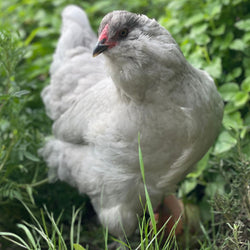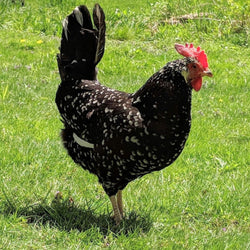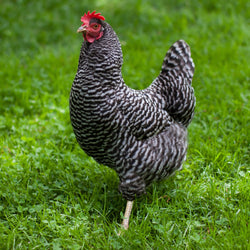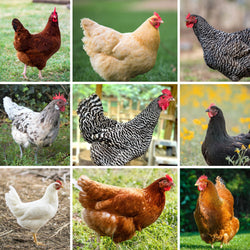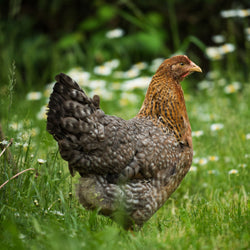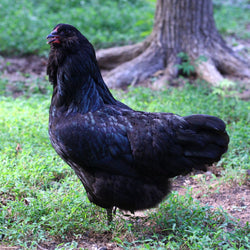page=10/--
Frequently Asked Questions
Here we answer the most commonly-asked questions about ordering, chicken care, and more.
What type of bedding or litter should I use for my chickens?
Bedding is an important part of keeping your chickens happy and healthy. On the coop floor the bedding will provide a soft surface for your chickens to walk on and will absorb droppings and odor. You want your coop sanitary and sweet-smelling, don't you? In the nest, bedding will give freshly-laid eggs a soft landing so they don't crack. (A cracked egg is a spoiled egg.) Recommended bedding: Pine shavings Aspen shavings Hardwood shavings Whatever you choose to use, the bedding in your coop should be at least 2" thick--more is better. There are many bedding materials to choose from,...
Read MoreCan I use chicken manure in my garden?
Chicken manure makes great compost for fertilizing your garden. However, we recommend you compost it first: don't add it directly in quantity. Uncomposted chicken manure is very "hot": too much nitrogen can burn your plants. Once your manure is composted, it is great for your garden, however. Chicken manure does not acidify soil: it tends to raise the pH. Actually, one study demonstrates that chicken manure is as effective as lime in raising soil pH (making it more basic rather than more acidic). That same study shows that plants can absorb more calcium from the manure than from lime due...
Read MoreCan different chicken breeds cross-breed?
Yes, they can! There are no problems associated with hatching mixed breed chickens. If you have a rooster in your flock, he will try to breed ALL your hens, nevermind if he is a different breed or even if the hens are different sizes, bantam and large fowl. It can be fun to hatch "mixed" eggs, because you never know what you'll get! Actually, many of the breeds we offer at My Pet Chicken are designer cross-breeds, and the results are spectacular: wonderful plumage colors, fantastic new egg colors, prolific egg-laying, friendly personalities and ultra-hardiness. For instance, we loved our...
Read MoreWhat size should my nest boxes be, and how should I place them?
Nest box sizes and placement are different for chickens, ducks, and geese. Providing your birds with the correct number of nesting boxes that are sized and situated properly can help ensure that your flocks' eggs remain fresh and clean and are easy to collect in a timely manner. You can find tips for all three types of birds below. Chicken Nest Box Size and Placement Location: Hens like to lay in a dark, safe area away from the traffic of the flock. Their nesting boxes should be placed off the ground at least a few inches. This provides the laying hens...
Read MoreHow do I care for a wounded chicken?
It's so stressful to have a hurt chicken! If you've got an emergency, or a wound situation you don't feel equipped to handle, try our friends at VetTriage. They are open 24/7/365 and are ready to provide tele-health services for your chicken or any other bird for a reasonable fee. (This hen was attacked but made a beautiful recovery) That said, you may be equipped to handle the wound by yourself. Here's how we recommend you go about doing it. Step-by-step instructions for treating a wounded chicken Separate your wounded chicken from the rest of the flock first, otherwise the...
Read MoreWhat is the best way to wash and store my eggs?
It's counter-intuitive but true: Your eggs will stay fresher if you don't wash them at all. When your hens lay eggs, there is a natural coating that is laid on top called the "bloom" that helps keep out bacteria. When you wash eggs, you can drive some bacteria in through the pores of the shell, so it's a bad idea to do so unless needed just before cooking as a general practice. If your nests are clean, your eggs should be clean. In fact, fresh eggs don't really even need to be refrigerated if they're going to be used soon....
Read MoreHow much does it cost to feed a chicken?
A basic estimate is that chickens will eat 1/4 pound per day per chicken. However, that estimate is based on the conditions commercial layers face in factory farm conditions and are not necessarily accurate estimates for backyard chicken keeping. They're estimates for high-production, economical producers of eggs in controlled conditions year-round, who may be highly stressed and who certainly have no access to pasture. Such estimates are probably not accurate for bantam or heritage breeds of chickens kept in backyard conditions. Chickens kept in hobby farm conditions have varying egg production based on breed and season, have varying sizes from...
Read MoreShould I give my chicks medicated feed or unmedicated feed?
Medicated feed is formulated for chicks to help them combat coccidiosis, a disease that is found just about everywhere in the environment. Most medicated starter feeds contain the medication amprollium. Amprollium does not *treat* coccidiosis, but it helps the babies fight off cocci oocysts while they develop their own immunity. It is a preventative. If your birds have been vaccinated against coccidiosis, feeding them medicated feed will nullify the coccidiosis vaccination, although it will not hurt them. (We do not offer the coccidiosis vaccine, as it is too stressful on the birds--we offer the Marek's vaccine, which is not affected...
Read More







"The Clubhouse" Coop
Easy to assemble and built to last, the Clubhouse Coop is the perfect starter coop for a small flock.

